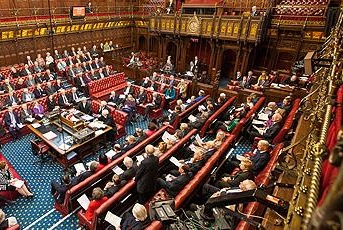New report raises concerns over the system of accepting assurances to offset the risk of extradition leading to human rights abuse
A major new report by the House of Lords Committee investigating extradition law has concluded that the system of seeking, accepting and monitoring assurances during the extradition process cannot guarantee the UK is meeting its human rights obligations.
You can read the 150-page report, Extradition: UK law and practice, here.
 Image credit: UK GovernmentThe report states: "We are concerned about the system of accepting assurances to offset the risk of extradition leading to human rights abuse. Although we conclude that the courts are effective in balancing the need to protect human rights against the public interest in the administration of justice through extradition, we do not believe that the system of seeking, accepting and monitoring assurances provides sufficient confidence that the UK is meeting its human rights obligations. We believe we need, in the Home Secretary's words, 'greater assurance to the assurances'."
Image credit: UK GovernmentThe report states: "We are concerned about the system of accepting assurances to offset the risk of extradition leading to human rights abuse. Although we conclude that the courts are effective in balancing the need to protect human rights against the public interest in the administration of justice through extradition, we do not believe that the system of seeking, accepting and monitoring assurances provides sufficient confidence that the UK is meeting its human rights obligations. We believe we need, in the Home Secretary's words, 'greater assurance to the assurances'."
In the report, the Committee also called for the Government to re-examine its decision to means test legal aid in extradition cases. Chairman of the Committee, Lord Inglewood, said he was disturbed that the main reason for not retaining legal aid in extradition cases appears to be an economic one, with little regard for the interests of justice.
A press release quoted Lord Inglewood as saying: "Extradition will always be a complex, sensitive and potentially controversial issue. In many cases, the stakes are high on a personal and, occasionally, international level. The Committee's investigation has found that there is no systemic problem with the UK's extradition regime. It provides a suitably swift extradition system to support the administration of justice, whilst ensuring that there are safeguards for those whose extradition is sought. However, this is not to say that there are not areas of concern which must be addressed."
"The Government must examine the practice of extradition taking place on the basis of assurances from the Issuing State. Assurances are given when there is a real risk of a person's human rights being breached if they are extradited. The UK must be confident that it is fulfilling its obligation to ensure that extradition will not lead to human rights abuses."
"We are pleased that the Government is reviewing how assurances are monitored; this work must be completed as a matter of urgency. Furthermore, we believe that details of all assurances given to the UK should be collated and published regularly to improve the transparency of the process, enable the robust monitoring of assurances and allow for remedies and sanctions should the assurances not be adhered to."
"The Committee also believes that the Government's response to the review into the Extradition Act 2003 by Sir Scott Baker, which in general endorsed existing arrangements, was inadequate with regard to Sir Scott's concerns about means testing for legal aid in extradition cases. We conclude that the Government's response to calls to remove means testing for legal aid in extradition cases was simply not sufficient or detailed enough to address the seriousness of the concern. We are calling on the Government to carry out a much more precise analysis of the cost of removing means testing. In a similar vein to the recent report by the House of Commons Public Accounts Committee, I am disturbed that the main case for not retaining legal aid in this area appears to be an economic one, with little regard for the interests of justice. This is especially worrying as extradition can be a harsh and distressing process frequently affecting people who have yet to be tried for a crime. With this in mind, we recommend that if a serious cost-benefit analysis of the issue does not find very clearly in favour of means testing, legal aid ought to be awarded automatically in extradition cases."
"Our report addresses two of the most controversial aspects of extradition law: the European Arrest Warrant and UK/US extradition. We conclude that the EAW is a vital tool in fighting crime across the EU but we recognise that it has been in the past overused and, on occasions, misused. We want the Government to work with the European Commission and other Member States to make sure EAWs are used as an instrument of last, rather than first, resort. We support the changes the Government has made to the Extradition Act 2003 to address some of the concerns about the EAW."
"With regard to UK/US extradition, we recognise many of the concerns about the US justice system, particularly lengthy periods of pre-trial detention and difficulties in obtaining bail. The courts have found the US justice system to be ECHR compliant; however, legitimate concerns remain. To address this, we recommend that Government seek a clearer understanding with the US, and potentially other extradition partners, as to how those who are extradited will be treated. We should of course be mindful that extradition arrangements must involve each country accepting, to a degree, the criminal justice systems of the other."
The House of Lords Committee was established in March 2014 to conduct post-legislative scrutiny into the law and practice relating to extradition, in particular the Extradition Act 2003.